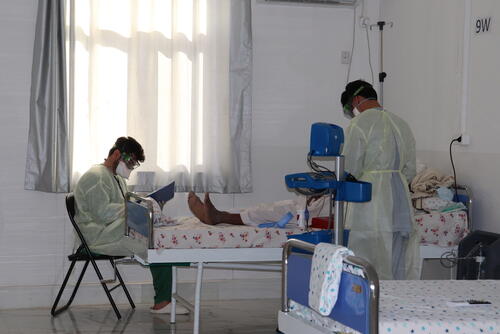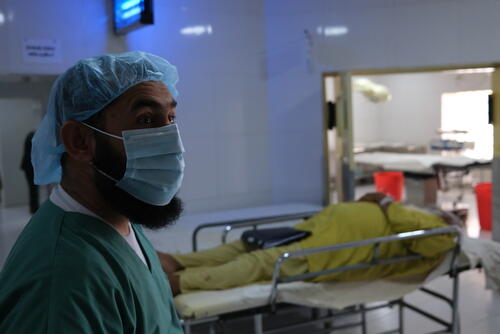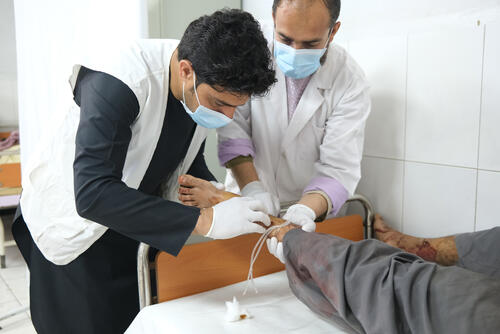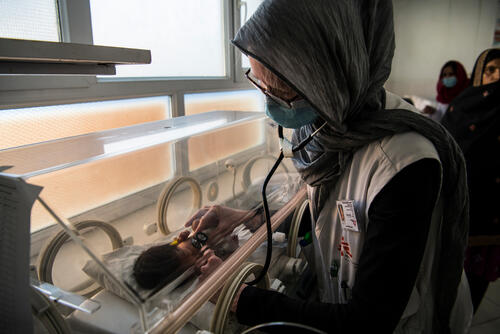Due to an increase in the number of people with severe COVID-19 in Herat, western Afghanistan, the Médecins Sans Frontières (MSF) COVID-19 treatment centre in Gazer Ga reopened on 2 December 2020. The centre reopened to support the Ministry of Public Health’s COVID-19 referral structure in Shaidayee hospital with the increase of cases; currently, the average number of new admissions has dropped to around four patients per day.
MSF’s COVID-19 treatment centre (CTC) was first opened on 28 June 2020 in order to reinforce response to the first wave of the pandemic and was closed by end of September; it was reactivated again in December 2020 as the number of cases started to rise again. The treatment centre in Gazer Ga currently has 20 beds, including a 10-bed unit for high-dependency oxygen. Its capacity can increase to 32 or even 48 beds depending on the evolution of the pandemic.
In the past few weeks, we have adapted oxygen therapy management, especially for people with severe cases, by adding nasal high flow oxygen and Continuous Airway Positive Pressure therapy. Since the onset of winter, the number of severe patients admitted requiring oxygen has remained stable at the CTC.
“MSF is continuing to follow the COVID-19 situation closely in Herat with the Ministry of Public Health and other partners, in order to adapt our activity to the needs,” says Melusi Mabhena, head COVID treatment nurse for MSF.

Between 2 December and 31 January, 258 patients were admitted to the Gazer Ga facility. Of these, 246 have been discharged, with 19 among them being referred to other facilities; seven people died.
The first case of COVID-19 in Afghanistan was recorded in late-February 2020 in Herat. The virus then quickly spread to the whole province and neighbouring ones in March, as tens of thousands of migrant workers crossed the border from Iran back into Afghanistan, making Herat their transit route to return home to their provinces. According to Ministry of Public Health official data, Herat remains the second-most affected province after Kabul, with more than 9,143 confirmed cases and around 424 reported deaths.
Accessing healthcare, a challenge in Herat
The private cost of accessing healthcare in Herat city makes it more challenging for patients. In most of the cases, considering the overall socio-economic situation of people, patients cannot afford treatment in private health facilities.
“I couldn’t have afforded the private cost of the treatment. It is winter now, so there is less work,” says Abdul Qader, a COVID-19 patient in Gazer Ga. “Sometime my sons find labouring jobs, but not always. We get through the day somehow. But with all this (treatment and hospitalization), we have lost a lot of money. My sons have had to borrow.”
In the clinic for internally displaced people on the outskirts of the city, MSF teams have also recently started doing rapid diagnostic tests for patients coming from the areas of Kahdestan, Shaidayee and Sharak-e-Sabz.
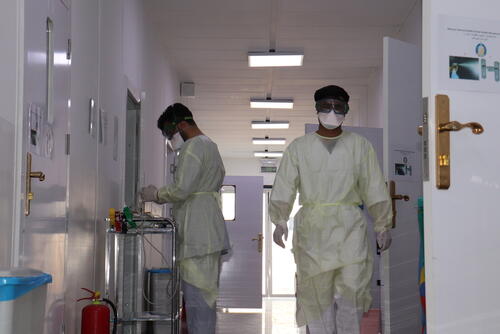
MSF has been running triage and screening activities since April 2020 in Herat regional hospital. In the last few weeks, the number of consultations has reached an average of 74 patients per day, most of whom are encouraged to self-isolate at home and are followed up with phone calls on specific days to monitor their progress. In case no progress is seen in their health status, they are advised to return to the regional hospital.
In the last four weeks, 132 patients suffering from severe COVID-19 have been referred to the MSF COVID-19 treatment centre in Gazer Ga and 34 patients to the COVID-19 treatment centre in Shaidayee, run by Ministry of Public Health and Agency for Assistance and Development.
Improve public’s awareness on COVID-19 symptoms
The public’s awareness on COVID-19 symptoms remains very limited in Herat province, and a lack of information surrounding the virus has been present in the community since the first case was detected in the province. As it is winter, staff in our COVID-19 centre have seen that most of the patients with the virus thought they had the flu. And most had a very limited knowledge of infection prevention and control measures.
In order to raise awareness of COVID-19 symptoms among the patients, our teams in the triage unit of the Herat regional hospital, the Gazer Ga COVID-19 Treatment Centre and the clinic for internally displaced people have been carrying out health promotion activities.
Since the start of the COVID-19 pandemic in Afghanistan, MSF has been implementing infection, prevention and control (IPC) measures in its existing programmes and accompanying the Ministry of Public Health in preparing and/or facing the pandemic. In Lashkar Gah, Boost Hospital, MSF is continuing to refer suspected COVID-19 patients to Malika Suraya – the main dedicated COVID-19 facility in Helmand province. In Kandahar, MSF is supporting the designated inpatient isolation facilities for the management of DR-TB patients infected with COVID-19.



